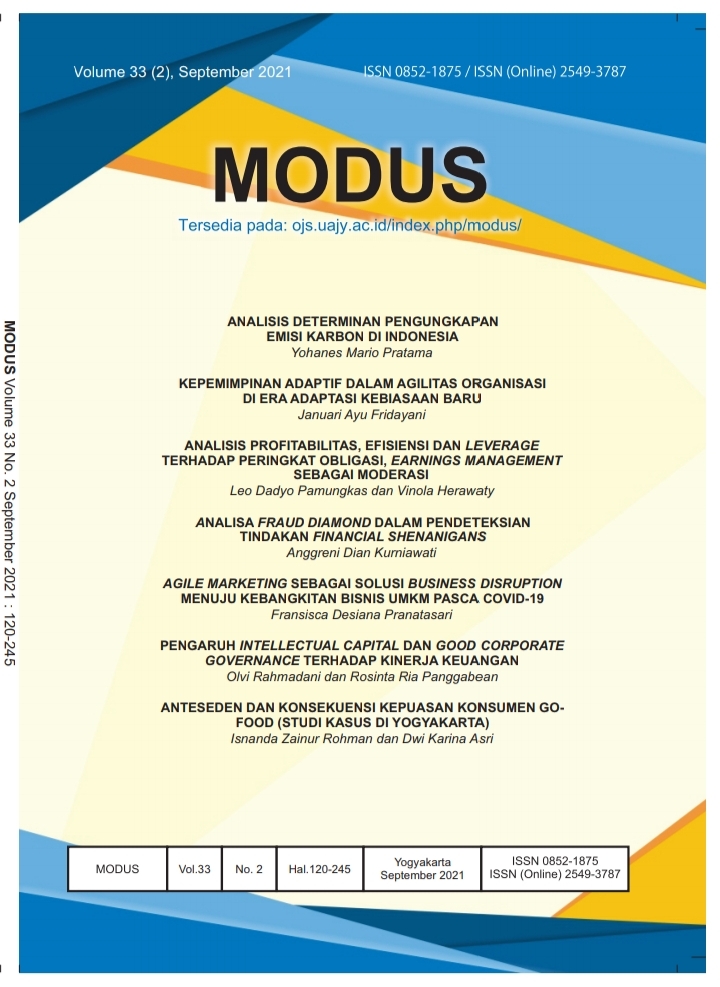ANALISIS PROFITABILITAS, EFISIENSI DAN LEVERAGE TERHADAP PERINGKAT OBLIGASI, EARNINGS MANAGEMENT SEBAGAI MODERASI
DOI:
https://doi.org/10.24002/modus.v33i2.4656Abstract
ABSTRACT
This study aims to analyze the profitability, efficiency and leverage influence on bond rating moderated by earnings management. The type of research used was causal study. This research also used time series and cross sectional data. Purposive sampling was used as data collection method, which resulted in collection of 120 samples from 24 banks during period of 2012-2016. SPSS 20 multivariate logistic regressions analysis was used to analyze data. The results of the research prove that both profitability and efficiency have positive influences on bond rating. Leverage has a negative influence on bond rating. Earnings management strengthens the influence of leverage on bond rating. Earnings management does not have an influence on bond rating. Earnings management does not weaken the influence of profitability on bond rating. Earnings management does not weaken the influence of efficiency on bond rating.
Keywords: profitability; efficiency; leverage; earnings; bond
ABSTRAK
Penelitian ini bertujuan menganalisis pengaruh profitabilitas, efisiensi dan leverage terhadap peringkat obligasi dengan earnings management sebagai variabel moderasi. Jenis penelitian yang digunakan adalah causal study, dimana menurut dimensi waktu penelitian menggunakan data pooling yang merupakan gabungan dari data time series dan cross section. Metode pengumpulan data menggunakan metode purposive sampling yang menghasilkan obyek 24 bank selama periode tahun 2012-2016 sehingga diperoleh sebanyak 120 sampel. Metode analisis data menggunakan analisis multivariate yaitu regresi logistik dengan bantuan program SPSS 20. Hasil penelitian ini membuktikan bahwa profitabilitas dan efisiensi berpengaruh positif terhadap peringkat obligasi. Leverage berpengaruh negatif terhadap peringkat obligasi. Earnings management memperkuat hubungan leverage terhadap peringkat obligasi. Earnings management tidak berpengaruh terhadap peringkat obligasi. Earnings management tidak memperlemah hubungan profitabilitas terhadap peringkat obligasi. Earnings management tidak memperlemah hubungan efisiensi terhadap peringkat obligasi.
Kata kunci: profitabilitas; efisiensi; leverage; earnings; obligasi
References
Chong, B.U., Hwang, I.D., dan Kim, Y.S. (2014). Credit Rating and Short- Term Debt Financing: Empirical Analysis of Listed Firms in Korea. www.apjfs.org/conference/2014/cafmFile/9_3.pdf
Crabtree, A., Maher, J.J., dan Wan, H. (2014). New Debt Issues and Earnings Management. Advances in Accounting, 30(1), 116-127.
Ertan, A. (2013). Real Earnings Management in the Financial Industry. https://www.gsb.stanford.edu/sites/gsb/files/working-paper-accounting-2013-ertan.pdf
Hassan, O.A.G., dan Barrell, R. (2013). Accounting for the Determinants of Bank’s Credit Ratings. Economics and Finance Working Paper Series N0. 13-02.
Hung, K., Cheng, H.W., Chen, S.S., dan Huang, Y.C. (2013). Factors that Affect Credit Rating: An Application of Ordered Probit Models. Romanian Journal of Economic Forecasting, XVI (4), 94-108.
Ikatan Akuntan Indonesia (2017). Standar Akuntansi Keuangan (SAK), Jakarta: Salemba
Kasmir. (2014). Dasar-dasar Perbankan. Edisi Revisi, Jakarta: Raja Grafindo Persada.
Kim, Y.S., Kim, Y., dan Song, K.R. (2012). Credit Rating Changes and Earnings Management. http://www.apjfs.org/conference/2012/cafmFile/6-3.pdf
Kolozsvari, A.C., dan Macedo, M.A.S. (2016). Analysis of the Influence of Income Smoothing over Earnings Persistence in the Brazilian Market. Paper presented at the Third International Conference of the Journal of International Accounting Research (JIAR), São Paulo, SP, Brazil, July 2015
Murcia, F.C.S., Murcia, F.D.R., Rover, S., dan Burba, J.A. (2013). The Determinants of Credit Rating: Brazilian Evidence. Brazilian Administration Review (BAR), 11 (2), 188-209.
Musthafa. (2017). Manajemen Keuangan. Jakarta: Andi Publisher.
Nasution, M., (2013). Peran Komite Audit dalam Manajemen Laba Perusahaan Perbankan. http://p2m.polibatam.ac.id/wp-content/uploads/2013/05/04-Marihot-Artikel-Marihot-Nasution-Politeknik-Negeri-Batam-V0.pdf
Purwanti, A., dan Prawironegoro, D. (2013). Akuntansi Manajemen. Edisi 3, Jakarta: Mitra Wacana Media.
Reilly, F.K., dan Brown, K. (2012). Analysis of Investments and Management of Portfolios. International 10th Edition. Canada: South Western-Cengage Learning.
Scott, W.R. (2015). Financial Accounting Theory. 7th Edition, Ontario: Pearson Canada Inc.
Sekaran, U., dan Bougie, R. (2013). Research Methods for Business. 6th Edition, West Sussex-United Kingdom: John wiley and Sons Ltd.
Sihombing, H.J., dan Rachmawati, E.N. (2015). Faktor-faktor yang Mempengaruhi Peringkat Obligasi pada Perusahaan yang Terdaftar di Bursa Efek Indonesia. Jurnal Ekonomi, Manajemen dan Akuntansi, 24 (1) Juni 2015.
Subramanyam, K.R. (2014). Financial Statement Analysis. International 11th Edition, New York: McGraw-Hill Education.
Suwardjono. (2014). Teori Akuntansi Perekayasaan Laporan Keuangan. Edisi 3, Yogyakarta: BPFE Yogyakarta.
Thamida, N., dan Lukman, H. (2013). Analisis Faktor-Faktor yang Mempengaruhi Peringkat Obligasi pada Industri Perbankan yang Terdaftar di Bursa Efek Indonesia Periode 2008-2012. Jurnal Akuntansi Volume XVII No. 02, Mei 2013: 198-211.
Wajnsztajn, P., dan Heintz, C. (2016). Earnings Management and the Cost of Publicly Issued Debt. Degree Project in Corporate and Financial Management. http://lup.lub.lu.se/luur/download?func=downloadFile&recordOId=8886212&fileOId=8886218















